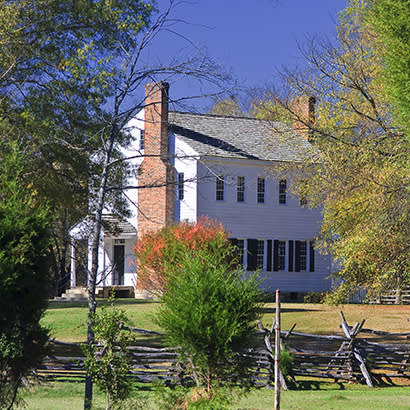
For an enhanced digital experience, read this story in the ezine.
Editor's Note: The following article contains additional information not included in the print version.
Managed by Mecklenburg County’s Park and Recreation Department, Latta Nature Preserve is a 1,460-acre passive recreation park that protects significant natural resources and provides water quality protection for Mountain Island Lake — the primary drinking water supply reservoir for the greater Charlotte, North Carolina, area. Located within the nature preserve is a circa 1800 historic farm and plantation known as Latta Place. The historic Latta site currently occupies about 16 acres within the preserve. There are 19 structures on the property, two of which remain from the original James Latta plantation. The property, historic house and several other historic structures are owned by Mecklenburg County.
When the property was purchased by the county in the mid-1970s, the management, maintenance and programming associated with the historic site was contracted to a nonprofit organization. Up until the summer of 2021, the nonprofit was charged with stewardship of the plantation grounds, along with a carriage barn, cabins and outbuildings, and the development of programming to give visitors a glimpse into 19th century life in the Carolina backcountry.
The Issue
In June 2021, the county opted not to renew its Annual Performance Agreement with the nonprofit organization. This was a result of significant public backlash over advertising for a post-coronavirus (COVID-19) Juneteenth event, called “Kingdom Coming.” Specifically, the issue was that the program description, posted on the nonprofit’s website and on social media, did not acknowledge the historical significance of June 19, a day that commemorates the final emancipation of slaves in the United States. Instead, the program description appeared to strike a sympathetic tone for those who had owned slaves, referring to one slave owner as an “overseer” and a “massa.”
Even though Mecklenburg County did not oversee day-to-day programs at the living history museum, park and recreation department staff took swift action to recommend the cancellation of their agreement. “That context, we felt, was not in accordance with what we were trying to do with the facility,” W. Lee Jones, director of Mecklenburg County Park and Recreation, says. Once the premises were vacated by the nonprofit, the complete responsibility for management and future programming became the sole responsibility of Mecklenburg County Park and Recreation.
The Present
The change in management opened the door for reinvention of the site — not by denying its painful past, but by allowing for a space to share its history from a sensitive, unbiased frame of reference. Since closing the site, Mecklenburg County has developed a basis for the project that consists of three phases: Discovery, Blueprinting and Implementation.
In Discovery, the department moved forward with goals of equity, inclusion and compassionate, truthful programming. Staff quickly initiated conversations with community partners, including museum professionals, local historians and experts in the interpretation of African American experiences during the antebellum period. The project team also consulted with scholars to ensure that next steps are informed by current research.
“We also drafted a mission statement to help focus our work. The mission statement evolved from peer research and feedback from the public and includes five key guiding principles: Truth, Transparency, Compassion, Transformation and Unity,” says Dena R. Diorio, Mecklenburg County manager.
“We believe that it is our duty to tell the truth and provide an experience that is not only educational, but [also] offers an opportunity for introspection and awareness.”
As a group, many of the greater team traveled to former historic plantation sites in the Carolinas, Virginia and Louisiana to better understand how other organizations manage, interpret and program their sites, looking for best practices. This partnership and commitment to the team allows intentionality in every decision and aspect of the project. In December, Mecklenburg County also conducted a public survey designed to gather input from the residents of Mecklenburg County on their thoughts surrounding the future of the historic site.
The Future
The Blueprinting phase will begin summer 2022, with the development of an Interpretative Master Plan that will be executed by an outside consultant. The goal of the plan is to help develop interpretative themes and a timeline for implementation. The Blueprinting phase also will include archival research and story collection from key descendants identified as having ties to Latta Place. The final phase, Implementation, will begin in fiscal year 2023-2024 and will conclude with the reopening of the site to the public.
The project taking place at Latta involves a tremendous amount of transformation. What began as a change in management has evolved into a journey of reflection and healing. This project has afforded all involved a chance to revisit the past with hopes of reshaping the future.
Chris Matthews is Division Director for Mecklenburg County Park and Recreation, Nature Preserves and Natural Resources.

